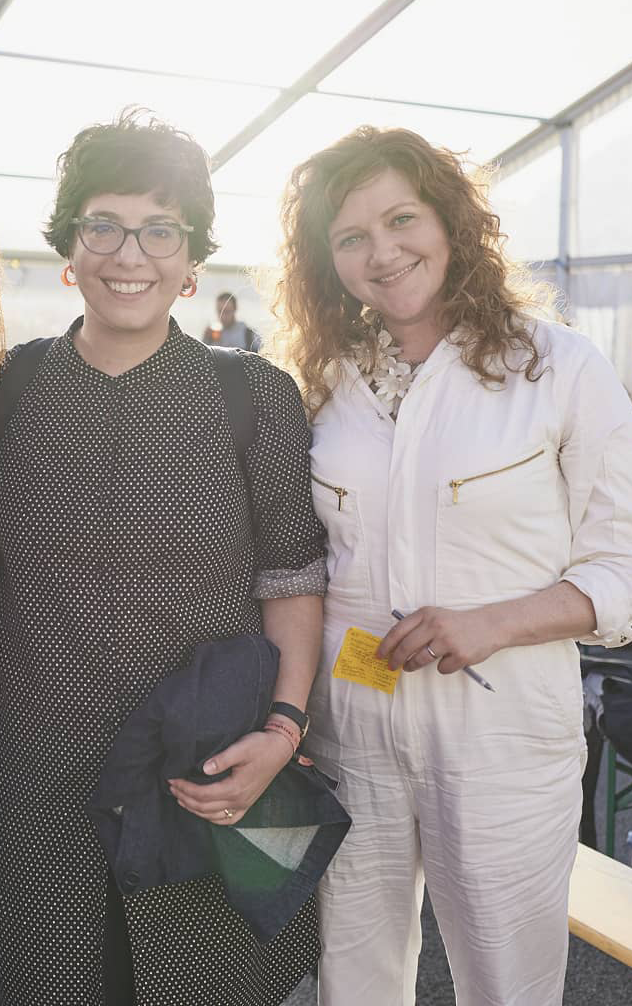Our Founding Story

Jennifer Brandel (left) and Mara Zepeda (right) presenting at Techfest Copenhagen in 2019.
Hearken generates power and possibilities.
Jennifer Brandel grew up in the Midwest, Mara Zepeda in the Southwest. Their lives have had eerily similar paths, finally converging in their early 30s. From an early age, they both recognized that the people with power and status weren’t necessarily the people with the best ideas, solutions, and vision for the future.
Brandel and Zepeda pursued a wide range of arts and humanities education, and spent the early parts of their careers as public radio reporters (at WBEZ and WHYY). Their deep appreciation for the power of deep listening, narrative, human connection, and curiosity led them to question the processes by which institutions made decisions, channeled power, and determined the outcomes of everyone’s lives.
In 2012, a mutual friend, Kate Joyce, introduced them to one another, and a deep friendship and working relationship immediately took root. In 2014, Zepeda started Switchboard: a company that provides a platform and philosophy to help teams and institutions engage their communities. The following year, Brandel started Hearken: a company that provides a platform and philosophy that helps teams and institutions better listen to their communities. They each had technical co-founders (Corey Haines for Hearken, Sean Lerner for Switchboard) who helped architect the platforms.
In the early years of the company, Brandel and Zepeda, the two artists-turned-reporters-turned-startup-founders kept an informal collaboration, trading insight on how to find ready clients and nurture the champions of their approaches. They realized early on they were selling a process for change that was made easier through their respective software products.
Their approach to work was collaboration over competition. They wanted to enrich the communities and stakeholders they served. Their companies prized long-term sustainable prosperity over exponential growth at all costs.
In 2016 they began co-authoring articles explaining their frustration with the “move fast and break things” status-quo playbook that startups were expected to follow. They were alarmed by the collateral damage of venture capital: a widening of the wealth gap, disruption to local communities, and massive wasted potential. Their inaugural post, Sex & Startups garnered global attention and attracted thousands more entrepreneurs who also felt trapped in a game that very few people ever won. A year later, joined by Astrid Scholz and Aniyia Williams, they articulated the types of companies they wanted to build instead and named them “zebras.” Unlike unicorns, zebras are real, mutualistic, and they survive in collaboration—not competition. They are black and white—for-profit and for-purpose. 2017 brought the first ever convening of zebra founders and investors at DazzleCon (a herd of zebras is called a “dazzle”). Zebras Unite was born, and is now a co-operative, non-profit, and fund for entrepreneurs of this different stripe. Zebras Unite represents the capital, community, and culture they wish they had when they were starting out.
In addition to starting this new movement together, Brandel and Zepeda saw opportunities for their own companies to work together in closer collaboration. While Hearken primarily served newsrooms and Switchboard primarily served colleges and universities, their theory of change and respective software products were extremely flexible, and applied to many different engagement needs: create a process to listen deeply and serve community needs, then scale that process through technology.
In 2019 they began a formal partnership, working together to add a consulting line of services to Hearken modeled after what Switchboard had done the year prior under the leadership of Chelsea Haring. Haring had come from a high-growth startup and saw first-hand the powerful combination of software and services to ensure customer success. This commitment to people and product deepened client relationships and ensured more lasting and meaningful change. Under Haring’s visionary leadership, the companies expanded their offerings and began co-delivering this new, more comprehensive suite of offerings. It became clear that not only did Zepeda and Brandel get so much out of working together, so did their teams. This merge represented a true ZE (Zepeda) + BRA (Brandel) of a highest order.
All of their experiences have been bound by a common thread: people need each other. But people don’t just need other people to make themselves as individuals feel better—networked communities function better. The Hearken Engagement Management System (EMS) and Switchboard Community Management System are two technologies that enable communities to function better. And our consulting helps to prepare teams, organizations and companies to put community at the center of their work and workflows.
Through this listening-based approach, Brandel and Zepeda have partnered with communities they are part of, and have also created and grown additional organizations and resources beyond Hearken and Switchboard, including:
-
XXcelerate, which provides business support, education and funding for Oregon womxn entrepreneurs, helping them to grow their businesses, connect with resources and peer support, and scale profitably.
-
Business for a Better Portland (BBPDX), Portland’s fastest growing chamber of commerce, which forges collaborative relationships with the business community, non-profit organizations, and government. Rather than prescribe our own solutions, BBPDXlistens to community leaders to determine where the business voice can be most helpful to their essential work.
-
Civic Exchange Chicago, a co-working space and learning community centered on how news, information and technology can increase democracy and freedom.
Hearken looks forward to listening to your needs and your community’s needs to build adaptable, innovative, and relevant products and services that grow power and possibilities and provide resilience and adaptability in the face of change.


